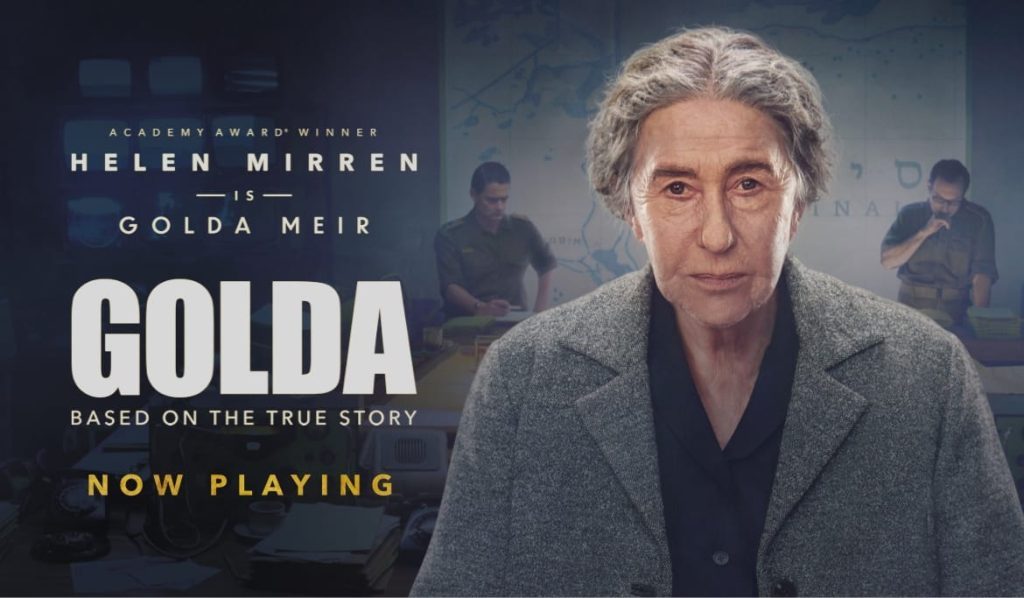Golda Meir, born of a Ukrainian Jewish family in Kiev in 1898, has featured in several screen depictions of episodes in her life, a life that was filled with grave and momentous events in which she played an important role. 2005’s Munich springs to mind, about the aftermath of the massacre of Israeli athletes at the 1972 Olympics.
This latest, Golda, is in similar vein, except Meir is here the central character around whom all activity revolves. It is not so much a biopic as something akin to a dramatized fly-on-the-wall documentary about how, as Prime Minister of Israel, she handled the Yom Kippur war of 1973, the last war in which Israel had to fight for its very existence.
The movie opens with a post-war scene in which Meir is being grilled by a governmental board – all men – inquiring into the conduct of the war, which Israel only narrowly ‘won’ after sustaining terrible loss of life and significant damage to its reputation for military indomitability, in which it had basked ever since its devastating pre-emptive victory against its Arab enemies in the six-day war of 1967.
Israel was ill-prepared for the surprise attack by a Soviet-backed coalition of Egypt and Syria on Yom Kippur, the Jewish Day of Atonement, in 1973. There were intelligence failures, strategic blunders and the aforesaid complacency about the capacity of their enemies. There was also the Israeli Defence Force’s policy never to abandon troops trapped behind enemy lines even if, as in this case, the effort to rescue them further compromised overall tactics and strategy.
Golda Meir is portrayed here by Helen Mirren who looks older than the 75 years Golda had clocked up by the time of the war. In fact she is older than Golda was at the time. But this is fitting; Meir was a chain-smoker who carried a terrible memory burden of Jewish persecution and struggle for survival, and it shows.
She remembered hiding in the cellar of her childhood home from drunken murderous Cossacks, before the family fled to America to escape the pogroms of Tsarist Russia. She lived through the Holocaust and the bloody campaigns that marked the establishment of the state of Israel. It’s no wonder she was a passionate Zionist. Only the year before Yom Kippur it was she who authorised the dispatch of Israeli operatives to track down and assassinate every individual associated with the murder of the athletes at Munich. Not all those who died in the revenge killings were guilty, a fact which weighed on her.
The storyline returns to the immediate lead-up to the war, and then the war itself – a period of some 20 days. To say she’s got a lot on her plate at this time would be a flippant understatement.
Mirren’s Golda is in every scene. The camera is on her in troubled sleep and as she struggles out of bed every day to confront not only the living nightmare of the war but the sundry discomforts of the medical treatment she is undergoing for the lymphoma which would kill her five years later.
She’s being treated in a special room at the morgue, presumably to keep the parlous state of her health secret. Each time she walks through to the treatment chamber we see the tagged toes of dead bodies lining the passage, and there are more of them every day.
It’s no wonder Golda hasn’t given up the fags, even though they’re killing her. Even as her body is about to slide into the maw of the big white machine, she lights up, takes a drag and hands it to her devoted carer.
The atmosphere is pure claustrophobia, and it’s even worse in the war room, where she joins her generals as they issue commands to terrified front-line soldiers facing tank and aerial attacks. Their responses are often bone-chilling; they are the shouts and screams of men scarcely able to believe they are about to die. But they do. Time and time again there’s an almighty explosion, then silence.
One of her staffers has a son at the front. It’s nothing short of harrowing to see how both women await the daily death reports.
This is no hagiography, but it does lay out in excruciating detail the agonizing moral, political and military dilemmas faced by this wartime leader. And the personal: there’s a clash of wills over tactics between her and rising general Ariel Sharon, and how should she deal with Moshe Dayan, architect of the famous Six-Day War victory and a national hero, but who she thinks is past it and should be sidelined?
Then there’s the diplomatic morass: Liev Schrieber plays Henry Kissinger, dour and unflappable. He wants to help the Israelis, who’ve suffered terrible losses of men and military hardware, but he considers himself an American first, then a Jew, and ultimately a diplomat who must negotiate with the Egyptians, the Syrians, the Saudis and the Russians to try to reach a settlement. His biggest problem is that if the Saudis see America giving arms outright to the Israelis, they will cut off America’s oil. And if the Israelis use their atomic weapons, there is the risk of drawing the Soviets into a wider global catastrophe.
There are revelations towards the end about how the blame landed for a crucial intelligence failure. I daresay it’s all on the public record now but I won’t spoil the drama here.
Golda was completed and released by August 2023, thus predating the murderous raid by Hamas terrorists on October 7th of that year. If you are of the view that Israel has no right to exist, you might be unsympathetic on the Big Picture, but you’d have to have a heart of stone not to be moved by this depiction of an old woman having to make terrible decisions in the worst crisis she and her country had ever faced.

